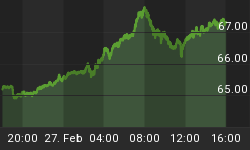It's true for almost any commodity: there are a lot of influences pushing on the price, and it's hard to untangle them all. But gold is exceptional. A single factor dominates the market price - and you can measure it.
More than any other commodity, gold's price rises (and falls) with demand from investors; the demand from consumers and industrial users is very much a secondary consideration. Or to put it another way, what ultimately controls gold is mass psychology.
If you were an investor during the internet craze, do you recall the absolute hysteria about Nasdaq stocks? Do you remember how everyone knew about them? Do you recall the excited banter about the latest internet company you heard at work, at home, or with friends? Do you remember the stories of people getting rich almost overnight? I still remember a news report saying that local officials at Lake Tahoe were worried because all the dot-com millionaires from Silicon Valley were buying up lakefront property and building wall-to-wall mansions, blocking everyone else's view.
Those companies weren't really worth 400 times earnings, and many had no earnings at all. Yet most such stocks didn't just double or triple, but increased by a factor of 10 or more. There were internet stocks that went up 100 fold.
Is this happening to gold right now?
Hardly. The general public is nearly indifferent to gold - which is evidence that the Mania stage is still in front of us, and it foretells the kind of hysteria that will come as the economy's troubles deepen. Except that tomorrow's mania for gold investments will be stronger than yesterday's mania for internet stocks. With gold, we won't just have the greed factor, we'll also have the fear, or flight to quality, factor banging on the price.
If this is true, is it possible to project how high mass psychology could push gold? And just as importantly, is there a way to determine when you should sell? Predictions abound, but talk is just too easy. So I've devised a simple method for you to calculate, for yourself, where the price of gold will peak, so you'll know when to sell.
To get your personal gold score, take this 2-minute quiz about what you read and what you hear from the people you know. Here's the key to score each answer you give:
- If an answer is zero: Score 1 point
- If an answer is between 1% and 10%: Score no points
- If an answer is above 10%: Take away one point
Personal Gold Score Quiz:
-
Of all your family members, what percentage have told you they own gold in any form?
Nobody: Score 1.
Some but not more than 10%: Score 0.
More than 10%: Score -1.
-
Of all your friends, how many have told you they've purchased gold or gold stocks? Score 1, 0 or -1.
-
Of all your co-workers, how many have discussed anything positive related to gold? Score 1, 0 or -1.
-
Of the neighbors you talk with regularly, how many have initiated conversation about any topic centering on gold? Score 1, 0 or -1.
-
How many conversations have you had with any other party (at work, at a gym, on an airplane, after a religious service, etc.) who spoke positively about gold in any way? Score 1, 0 or -1.
-
Excluding any gold-related websites or publications you regularly read, what percentage of all the materials you read (magazines, newspapers, online articles, etc.) discuss gold in a positive way? Score 1, 0 or -1.
-
What percentage of the investment vehicles available through your company's IRA, 401k or other retirement plan include something explicitly related to gold? Score 1, zero, or -1.
Add up your score, and then multiply it by gold's current price (let's use $900 per ounce). And there's your personal forecast for gold's price peak. Excluding my co-workers at Casey Research, my total was 5, which gives me a personal gold forecast of $4,500. So maybe, just maybe, I'll be selling when gold hits $4,500.
Of course, this is hardly a precise or scientific way to calculate where gold is going. But it draws on a critically important point, and I bet you're thinking the same thing I am: I know hardly anyone who owns gold! Which means, of course, there are a lot of people who have yet to buy it.... and a lot of funds that have yet to include it... and a lot of magazines and newspapers that have yet to cover it. Which means there's a long way up for gold yet.
Recall the internet craze, substitute gold in its place, and voila - it's easy to see how gold goes to the moon on mass psychology alone. I'm confident that day is coming.
The current dip is calling. Will you benefit from it?
Jeff Clark is the editor of BIG GOLD, a Casey Research publication that pinpoints the safest ways to capitalize on the gold bull market. The next issue includes an interview with Doug Casey; learn what made Doug such a spectacularly successful gold investor, and where he sees gold and gold stocks going in the near future. Try a 3-month risk-free trial here...















